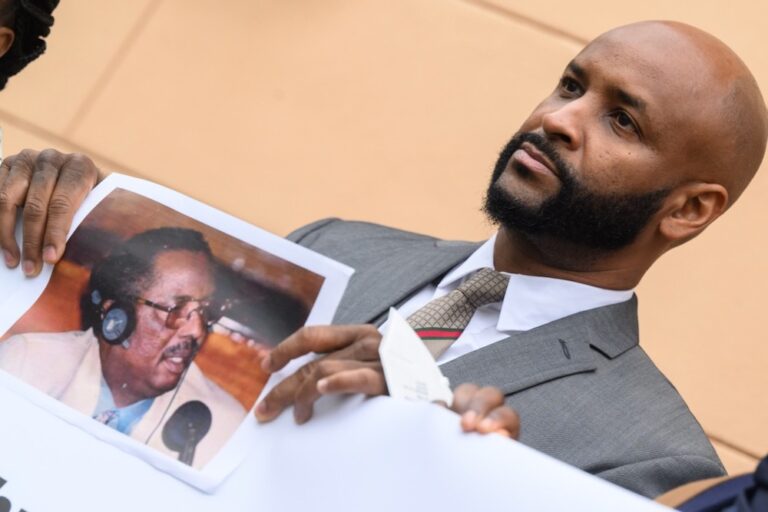(CPJ/IFEX) – In a 10 July 2000 letter to Gambian President Yahya A.J.J. Jammeh, CPJ expressed its deep concern about recent press freedom violations in The Gambia, including the prosecution of one journalist on murder charges. Based on the organisation’s investigation into the abuses related in this letter, CPJ has come to the unfortunate conclusion […]
(CPJ/IFEX) – In a 10 July 2000 letter to Gambian President Yahya A.J.J. Jammeh, CPJ expressed its deep concern about recent press freedom violations in The Gambia, including the prosecution of one journalist on murder charges. Based on the organisation’s investigation into the abuses related in this letter, CPJ has come to the unfortunate conclusion that these attacks against journalists are not isolated incidents, but part of a systematic campaign to suppress reporting on issues of legitimate public concern.
CPJ is appalled by the murder charges brought against Madi Ceesay, a journalist for the Banjul-based weekly “Gambia News and Report”. According to CPJ sources in Banjul, Ceesay was arrested on 17 June following a clash between supporters of the ruling Alliance for Patriotic Reorientation and Construction (APRC) and members of the
opposition United Democratic Party (UDP). Ceesay, who is based in Banjul, was assigned to cover UDP activities. He was traveling with UDP supporters from Basse to Kundam when they were ambushed by members of the APRC.
Sources say police arrived on the scene, and Ceesay and the UDP supporters under attack were taken into “protective custody” and held at the Basse police station for two days under squalid conditions. An APRC supporter injured in the altercation died in the hospital on 18 June. On 20 June, Ceesay and several UDP members were charged with murder. Ceesay was released on bail, CPJ’s sources say.
While the case against Ceesay is still pending, the ongoing harassment of independent journalists in The Gambia continues. For example, managing editor, Allaji Yorro Jallow of the private Banjul daily “The Independent”, told CPJ that he and editor in chief, Baba Galleh Jallow were interrogated by immigration officials who questioned their Gambian citizenship. Baba Galleh Jallow’s elderly parents also were questioned. The editors believe these interrogations were in reprisal for a 19 June article which reported that an elected chief had been sacked, and a ruling party official was appointed as his replacement.
This unwarranted investigation is the latest abuse in a pattern of harassment against “The Independent” and its staff. Less than a month after the paper printed its first copies in July 1999, The Gambian Ministry of Justice ordered the paper to cease publication ostensibly because it had not registered as an incorporated company with the Commissioner of Income Tax. “The Independent”‘s management alleges that the government was punishing the newspaper for an article documenting abuses of human rights in The Gambia since the 1994 military coup.
While CPJ believes the situation facing Gambian journalists is extremely difficult, the organisation is encouraged by a recent positive development in a case involving Citizen FM radio which dates back to 6 February 1998. On that date, National Intelligence Agency (NIA) agents arrested Baboucar Gaye and Ebrima Sillah, Citizen FM’s proprietor and news editor, respectively. The radio station was shut down the following day. The arrests most likely were the result of Citizen FM’s report on a counterfeiting scandal which ended with the dismissal of the NIA’s director of operations. Gaye was found
guilty under the 1913 Telegraphic Stations Act of operating a radio station without a license. He was fined and ordered to transfer all of Citizen FM’s broadcast equipment to the state.
On 3 July 2000, High Court Judge Justice Wallace Grant quashed the 1998 ruling and ordered the state to return the radio station’s equipment to Gaye. Justice Grant remarked that the magistrate in the earlier action erroneously shifted the burden of proof to the defendant. The judge said the forfeiture of the radio station to the state was unlawful.
Judge Grant’s admirable ruling, however, in no way mitigates the other documented attacks on independent journalists. In fact, it highlights the ways in which government power has been abused.
Recommended Action
Send appeals to the president:
– condemning the grave charges brought against Ceesay and the persistent harassment of “The Independent” journalists, who are merely performing their professional duties
– noting that the ongoing persecution of “The Independent” journalists appears to be an attempt to silence unfavorable criticism and to stifle legitimate political discourse
– reminding him that the right to seek, receive and impart information is guaranteed
under several international covenants to which The Gambia is a party
– urging him to drop the charges against Ceesay and to terminate investigations into the nationality of “The Independent” staff, on the basis of His Excellency’s commitment to these fundamental freedoms
– also requesting that he demonstrate his commitment to freedom of the press in The Gambia by repealing or amending the repressive legislation which has been used to suppress the independent media
– asking His Excellency to affirm the principles of democracy by ensuring journalists can
practice their profession in The Gambia without fear of reprisal
Appeals To
APPEALS TO:President Yahya A.J.J. Jammeh
State House, Banjul
The Gambia
Fax: +220 227 034Please copy appeals to the source if possible.


